HISTORICAL PERSPECTIVES ON DEVIANT BEHAVIOUR
Psychological
disorders are not just a modern problem. The pages of history are filled with
accounts of prominent people who suffered from psychological disorders. The Bible describes King Saul’s mad rages and terrors. The 18th-century French philosopher
Jean-Jacques
Rousseau developed marked paranoid symptoms in
the latter part of his life and was plagued by fears of secret enemies. Mozart was convinced he was being poisoned during the time he was
composing his Requiem. Abraham Lincoln suffered recurrent bouts of depression throughout his life and
was, on one occasion, so depressed that he failed to show up for his own
wedding. Winston
Churchill also periodically suffered from severe
depression, referring to it as his “black
dog.” The billionaire aviator Howard Hughes became so terrified of being infected with germs that he became a
bedridden recluse for the last decade of his life. Dysfunctional behaviours
such as these do not go unnoticed. Throughout history, human societies have
explained and responded to abnormal behaviour in different
ways at different times, based on their values and assumptions about human life
and behaviour.
1. Ancient Chinese, Egyptians, and Hebrews,
believed that abnormal behaviour is caused by supernatural forces and
attributed deviance to the work of the devil. One ancient treatment was based
on the notion that bizarre behaviour reflected an evil spirit’s attempt to
escape from a person’s body. In order to release the spirit, a procedure called
trephination
was carried out. A sharp tool was used to chisel a hole in the skull
about 2 centimeters in diameter. It seems likely that in many cases trephination
successfully eliminated abnormal behaviour by putting an end to the patient’s
life. In other times, therapy pulling teeth, removing lengths of intestines,
cauterizing the clitoris, or giving transfusions of animal blood (Farina, 1982).
 |
| trephination |
2.
Medieval Europe, the demonological model
of abnormality held that disturbed people either were possessed involuntarily
by the devil or had voluntarily made a pact with the forces of darkness. Thus
in 1484 the Pope ordered “possessed” individuals to be burned alive (Nolen-Hoeksema,
2001). The killing of witches was justified on theological grounds,
and various “diagnostic” tests were devised. One was to bind a woman’s hands
and feet and throw her into a lake or pond. Based on the notion that impurities
float to the surface, a woman who sank and drowned could be posthumously
declared pure (a pronouncement that must have been enormously comforting to her
loved ones). Of course, a woman who floated was in real trouble. During the 16th
and 17th centuries, more than 100,000 people with psychological
disorders were identified as witches, hunted down, and executed.
3.
In the 5th century B.C.,
the Greek physician and philosopher Hippocrates credited with the invention of
medicine, believed in the connection between psychological and physical
disorders, the former being caused by the latter. He suggested that mental
illnesses are diseases just like physical disorders. Anticipating the modern
viewpoint, Hippocrates believed that the site of mental illness was the
brain. Hippocrates also attempted to
explain pathologies such as melancholia, mania, and phrenitis, which were
common disorders in ancient Greek society. Accordingly, psychological illness
was attributed to a physiological dysfunction.
Conversely,
Plato
(428–348 b.c.) argued that disorders should be understood in terms
of intrapsychical
conflicts. Rather than looking for physical causes, Plato was convinced
that mental disorders were, to put it simply, “all in the mind.”
4.
By the 1800s, the first attempt to
treat and help the mentally ill dates back to the 1700s, when Philippe Pinel
(1745–1826), anticipating the spirit of the French Revolution,
proposed the moral treatment of those affected by mental disorders.
Pinel’s methods introduced friendlier policies for hospitalized patients, such
as eliminating chains, preventing physical abuse, improving living conditions,
and even offering advice or moral guidance. Another major contribution by Pinel
was his attempt to categorize symptoms, which led to the broad differentiation
between melancholia, mania, dementia, and idiocy. Western medicine had returned
to viewing mental disorders as biologically based and was attempting to extend
medical diagnoses to them. The biological emphasis was given impetus by the
discovery that general paresis, a disorder characterized in its advanced
stages by mental deterioration and bizarre behavior, resulted from massive
brain deterioration caused by the sexually transmitted disease syphilis. This
was a breakthrough: the first demonstration that a psychological disorder was
caused by an underlying physical malady.





Comments
Post a Comment